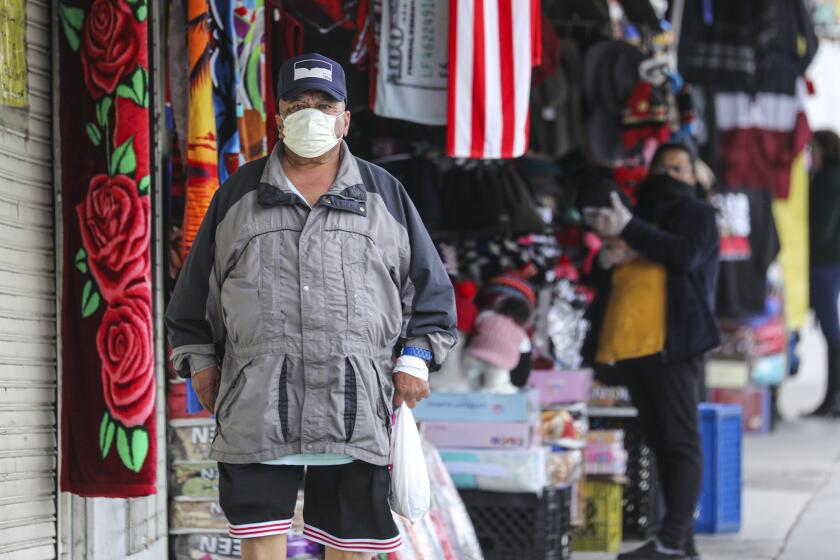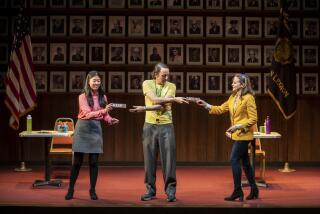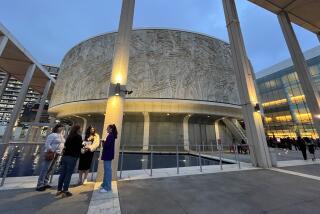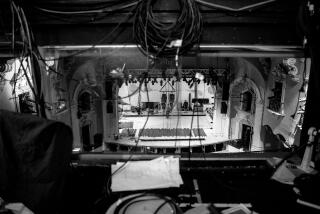Closed by coronavirus, nimble theaters work to roll out recorded performances
“Toni Stone” was just stepping up to bat. Lydia R. Diamond’s play, which recounts the real-life story of the first woman to play professional baseball, opened at San Francisco’s American Conservatory Theater on Wednesday night.
Hours after the curtain call, California Gov. Gavin Newsom recommended the cancellation of public gatherings with 250 or more people in an effort to slow the spread of the coronavirus. The cancellations would continue through March — the duration of the “Tori Stone” run at ACT’s 1,040-seat Geary Theater, effectively closing the show.
By Thursday evening, every major Los Angeles theater, as well as all of Broadway, had also scrapped March shows. Some have refunded tickets; others have postponed runs. Their hand-sanitizing stations, deep-cleaning routines and steep discounts hadn’t been enough to overcome a pandemic. Their financial prospects were in free-fall.
But “Toni Stone” — directed by Pam MacKinnon and choreographed by Camille A. Brown — isn’t leaving the pitcher’s mound just yet. ACT announced Thursday that, in preparation for a community-wide quarantine, the company had recorded previews and will be sharing the production with virtual audiences.
“Of course, we think it’s better to see theater live, since there’s an interplay between the audience and the actors onstage,” said Jennifer Bielstein, ACT’s executive director. “But once we realized that this would hit our city and community, we knew we’d have to stop performances to help contain and eliminate it. But we also wanted to provide a way for people to see ‘Toni Stone,’ which was meant to be seen. This just means that tens of thousands of people in the Bay Area will still get to see it, but from the comfort of their own home.”
Likewise, Berkeley Repertory will release a live recording of its production “Culture Clash (Still) in America,” as well as an upcoming capture of Jocelyn Bioh’s comedy “School Girls; Or, the African Mean Girls Play.” With three weeks of its run canceled, “School Girls” will be filmed next week in front of an audience of company staff and friends of the production.
Both companies always film each show for their archives already, but they used additional cameras this time. Though both company directors say the quality may not be as high as more technically advanced shoots of shows, which have used up to 14 cameras at a time, “we think it looks pretty good, given the circumstances,” Berkeley Rep managing director Susan Medak said. Added Bielstein, “Ultimately, we feel it’s a great alternative to never being able to see the show at all.”
Bielstein and Medak jointly requested approval last week from national unions — Actors’ Equity, United Scenic Artists, and the Stage Directors and Choreographers Society — as well as their shows’ respective playwrights and licensing houses.
“All of us went into this business because we love live theater, so it’s not that any of us want to replace that with this form,” Medak said. “But everyone realized these are extreme circumstances, and we have to at least look on a short-term basis at how we can deliver our work, the very thing we promised, to the audiences that care about us. The speed at which the unions have worked with us has been amazing; everyone has jumped all over this and helped us to make this work.”
The two theaters are in talks with BroadwayHD to make the recordings available to those who already had paid to see the production live. The streaming platform’s library boasts high-quality live captures of contemporary and classic shows from Broadway and the West End, as well as regional theaters.
Get the latest coronavirus updates from our staff in California and around the world.
The current coronavirus pandemic may spur the theater industry to reconsider its doubts about digitizing the theatrical experience, so that its actors, directors and designers can still have their work seen. It’s an idea that, thanks to the examples of the Metropolitan Opera in New York and the National Theatre in London, which record productions for presentation in movie theaters, is being embraced more by the stage community.
“Producers used to say, ‘We’re not doing it,’ but now they’re saying, ‘When should we do it?’” BroadwayHD founder Bonnie Comley said. “That’s a 180-degree change from when we launched 4½ years ago, when we did all the financing for every capture ourselves. Theater producers and organizations are seeing the value of it — that it doesn’t cannibalize their live ticket sales — and partnering with us financially.”
In fact, the 2015 livestream of “Daddy Long Legs,” the first-ever off-Broadway production to be streamed live, was an elaborate marketing initiative, and a successful one: It was viewed in 135 countries by 150,055 people — the equivalent of more than 2½ years of sold-out houses in its 130-seat theater — and led to an increase in ticket and cast album sales.
“‘Daddy Long Legs’ was a show that needed to get mass attention quickly because it was an off-Broadway show with no brand recognition, and we wanted to jump start the word-of-mouth without using a conventional ad mechanism,” producer Ken Davenport said. “I get it — our industry’s economics are so fragile, so we’re nervous to try new things. But even for smaller theater companies, filming and streaming is worth experimenting with, for sure.”
The hit musical’s return to L.A. for an eight-month run has been paused, following major cancellations elsewhere in the theater world.
Know Theatre of Cincinnati has been experimenting with budget-friendly livestreams, capturing shows programmed in its smaller theater — usually featuring work by non-union, local playwrights and actors — for the last five seasons. The clarity of smartphone cameras and the ease of Facebook Live allow the company to share the work with would-be ticketholders, watching while at home sick or even out of town. Sometimes a stream gets a handful of views, other times hundreds or thousands.
“For that space, our seating capacity is around 70, so even an additional 10 people tuning in is a not-insignificant audience increase,” said producing artistic director Andrew Hungerford. “As a smaller theater, anything we can do to help keep our audience connected and engaged is a win, even on a relatively small scale. And if that can also help us expand our audience, or reach someone who would never otherwise see the work of these artists, even better.”
Beyond video captures and livestreams, Audible has proved the market for audio-only recordings. The company has commissioned 25 new English-language works from theater playwrights and stages them at the Minetta Lane Theatre in New York. These plays are recorded in studio or on stage and then released after, during or even before the run has begun.
The audio of Kate Mulgrew and Francesca Faridany in “The Half-Life of Marie Curie” went online on opening night, and the stage show became one of its strongest-selling titles to date. Many tickets for the live play were purchased specifically after listening to the audio version.
Audiences aside, “playwrights are surprised by how fulfilling it is, because it’s such a hard look at the text,” artistic producer Kate Navin said. “Actors are also seeing that, even though it’s the same words, performing for a microphone to be heard right in someone’s ear is different than on a stage for 300 people. I think they’re surprised by how excited they get about thinking about the intimate experience.”
Amid these coronavirus cancellations, theater-makers are promoting digitized versions of their work. Young Jean Lee, whose new play “We’re Gonna Die” closed early off-Broadway, shared a video link to an early version of the full piece. Stephanie Alison Walker and Samantha Baird asked fellow playwrights to flag their titles in New Play Exchange, the database of theater scripts, so socially distanced creators can appreciate one another’s work.
L.A. Theatre Works will offer free access to 20 recordings of classic titles like “The Importance of Being Earnest” and “Romeo and Juliet” to teachers nationwide. “Kids are going to be in front of that computer for their online classes anyway, and listening to a play is an alternate way for them to learn,” said producing director Susan Albert Loewenberg.
And since Monday’s event at Marin Theatre Company has been canceled, Lauren Gunderson, the most produced playwright in America, will film her performance of her play “Natural Shocks,” with no public audience. The virtual recording will be released for free, and viewers will be encouraged to donate to the Marin Theatre.
Whether through donations or virtual ticket sales, these digital options can help cushion the financial blow caused by cancellations — not just of individual productions but of whole seasons and also lucrative fundraising galas and opening-night parties.
“Let’s say someone was planning to go see a show but has gotten sick,” Gunderson said. “What if a theater could say, ‘Please stay home, we had a plan for this. We recorded a staged-reading version of the play, and we’re sharing this with you — along with pictures of our set design and costume design — because you bought a ticket and we want to thank you for that?’
“I think that if theaters can share their work digitally and make money, it’d be pretty rad for all of us. In times like this, artistic people can come up with creative solutions — ones that might not just be temporary.”
More to Read
The biggest entertainment stories
Get our big stories about Hollywood, film, television, music, arts, culture and more right in your inbox as soon as they publish.
You may occasionally receive promotional content from the Los Angeles Times.












